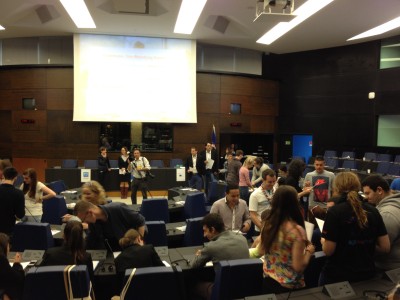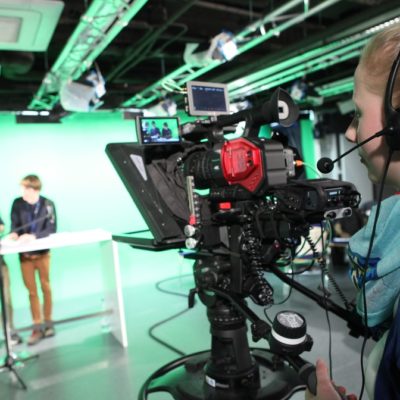by James Mulhall, Ireland, Freelance Journalist
It started with a game – but the Erasmus+ debate was no laughing matter for the students and patrons involved.
The Erasmus Student Network representative Daphne Scherer took the reigns in what turned out to be an engaging Q&A session with the Head of Sector responsible for overseeing the implementation of Higher Education activities under the Erasmus+ Vanessa Debiais-Sainton.
For an ice-breaker, the audience were tasked with running around, communicating with each other and trying to fill a list. Bemused, the young go-getters took the task in their stride and a winner soon emerged. This, in many ways, encompasses an Erasmus experience; people from varied backgrounds, with varied interests and linguistic skills, talking, laughing and helping each other.
The real meaning of the day, however, was to get into the nitty-gritty of the brand new Erasmus + programme.
Mobility. Opportunity. Challenges. These are three of the key outcomes of the Erasmus +.
Studying abroad has long been considered one of the EU’s most treasured assets. With no visas required, students can fly to almost anywhere within the EU for a semester or a year. 27 years ago, the Erasmus concept was born. That year, there were 3,000 participants across Europe. Under Erasmus +, 4 million EU citizens will be given every helping hand to move abroad for one key thing: opportunity.
What is going to change? One thing stood out as a vast improvement – the Master Loan. The opportunity for EU students to pursue postgraduate education elsewhere on the continent is one of the key developments in the programme.
Vanessa Debiais-Sainton took the inquisitive audience in her stride. Hard hitting questions about funding for Erasmus students, employability of alumni of the programme and difficulties before, during and after the move were answered.
Let’s return to the Master Loan, though. It may not be as common as undergraduate studying, but postgraduates can also avail of the Erasmus programme to further their careers. Why would anyone want to study abroad? What is the thing that would draw a student in? Aside from the life experience, the opportunities presented by Erasmus + make it a no-brainer.
Employers look favourably on graduates of the Erasmus programme. This then results in alumni reducing their chances of long-term unemployment by half. It also increases the chances of being promoted to managerial positions.
Couple these two things together. A postgraduate student is pumping a lot of money into their education. They are going to be serious about sourcing employment afterwards. Yes, the qualification alone will increase their employability. Add in an Erasmus and you are on to a winner.
What about those among us who already hold a Masters degree? The programme is appealing. It will attract applicants. How inclusive is Erasmus+?
“We don’t make the difference between the first or second Masters. We want to promote degree mobility at master level and this, we hope, will facilitate and support students to do that because it is so important to get the skills”, – Debiais-Sainton said.
True to the earlier atmosphere, Daphne Scherer concluded the event with – yes, you guessed it – another game.
This was again an interactive experience, with lots of standing up and sitting down.
One thing is for sure, though. The young people of Europe may be a dab hand at playing games, but they are also interested in their opportunities and their future.
It’s all about balancing work and play. Just like an Erasmus experience, really.












